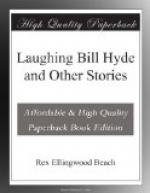“No! No! No!” she said, brokenly. “Don’t you think I understand? Don’t you think I see it all now? But why—why didn’t you tell me? Why?” When he did not answer she repeated: “God sent me back. I—I was not meant to be so unhappy.”
Austin felt himself shaken as if by a panic. He cried, hurriedly: “You see, we’ve been such good friends. I knew it would distress you. I—wanted to spare you that! You were a good comrade to me; we were like chums. Yes, we were chums. No friend could have been dearer to me than you, Miss Moore. I never had a sister, you know. I—I thought of you that way, and I—” He was struggling desperately to save the girl, but his incoherent words died on his lips when he felt her come close and lay her cheek against his arm.
“You mustn’t try to deceive me any more,” she said, gently. “I was here. I know the truth, and—I want to be happy.”
Even then he stood dazed and disbelieving until she continued:
“I know that you love me, and that I love you.”
“It is pity!” he exclaimed, hoarsely. “You don’t mean it.”
But she drew herself closer to him and turned her tear-stained face up to his, saying, wistfully, “If your dear eyes could have seen, they would have told you long ago.”
“Oh, my love!” He was too weak to resist longer. His arms were trembling as they enfolded her, but in his heart was a gladness that comes to but few men.
“And you won’t go away without me, will you?” she questioned, fearfully.
“No, no!” he breathed. “Oh, Marmion, I have lost a little, but I have gained much! God has been good to me.”
THE REAL AND THE MAKE-BELIEVE
On his way down-town Phillips stopped at a Subway news-stand and bought all the morning papers. He acknowledged that he was vastly excited. As he turned in at the stage door he thrilled at sight of the big electric sign over the theater, pallid now in the morning sunshine, but symbolizing in frosted letters the thing for which he had toiled and fought, had hoped and despaired these many years. There it hung, a dream come true, and it read, “A Woman’s Thrall, By Henry Phillips.”
The stage-door man greeted him with a toothless smile and handed him a bundle of telegrams, mumbling: “I knew it would go over, Mr. Phillips. The notices are swell, ain’t they?”
“They seem to be.”
“I ain’t seen their equal since ‘The Music Master’ opened. We’ll run a year.”
This differed from the feverish, half-hysterical praise of the evening before. Phillips had made allowances then for the spell of a first-night enthusiasm and had prepared himself for a rude awakening this morning—he had seen too many plays fail, to put much faith in the fulsomeness of first-nighters—but the words of the doorman carried conviction. He had felt confident up to the last moment, to be sure,




